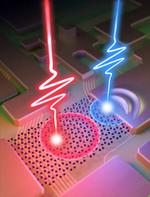Other

“The secret, a University of Rochester optics professor explains, is to harness the power of metals. Silicon, the standard semiconducting material used in a host of applications—computer central processing units (CPUs), semiconductor chips, detectors, and solar cells—is an …

“Scientists have discovered a new way to investigate the structure of protons using neutrinos, known as ‘ghost particles.’ Neutrinos are one of the most abundant particles in our universe, but they are notoriously difficult to detect and study: they don …

“First-of-its-kind experimental evidence defies conventional theories about how plasmas emit or absorb radiation. Most people are familiar with solids, liquids, and gases as three states of matter. However, a fourth state of matter, called plasmas, is the most abundant form …

“Rochester researchers see applications in LiDAR, atomic physics, AR/VR. How do you integrate the advantages of a benchtop laser that fills a room onto a semiconductor chip the size of a fingernail? A research team co-led by Qiang Lin …

“A team of scientists, including Rochester biologist Anne S. Meyer, is developing bioplastics to degrade in oceans. Plastic waste poses an urgent problem for our planet’s ecosystems, especially our waterways. Millions of tons of plastic waste enter Earth’s …

“Rochester researchers hope to explain how the fields occur in plasma instabilities. The famous Pillars of Creation in the Eagle Nebulae—a star nursery—are believed to result from the hydrodynamic instabilities that form when plasmas are exposed to high …

“Novel University of Rochester solution paves the way for cutting-edge photonics. One of the most tedious, daunting tasks for undergraduate assistants in university research labs involves looking hours on end through a microscope at samples of material, trying to find …

“Researchers at Rochester and Erlangen have taken a decisive step toward creating ultrafast computers. A long-standing quest for science and technology has been to develop electronics and information processing that operate near the fastest timescales allowed by the laws of …

“Rochester researchers use ‘counterfactuals’ to verify predictions of drug safety. Scientists rely increasingly on models trained with machine learning to provide solutions to complex problems. But how do we know the solutions are trustworthy when the complex algorithms the models …

“A University of Rochester project uses flat panel technology to build a more cost-effective device that can also function as a touch interface. Over the past decade, smart devices have become essential components of daily life: doorbells, watches, keychains—even …
